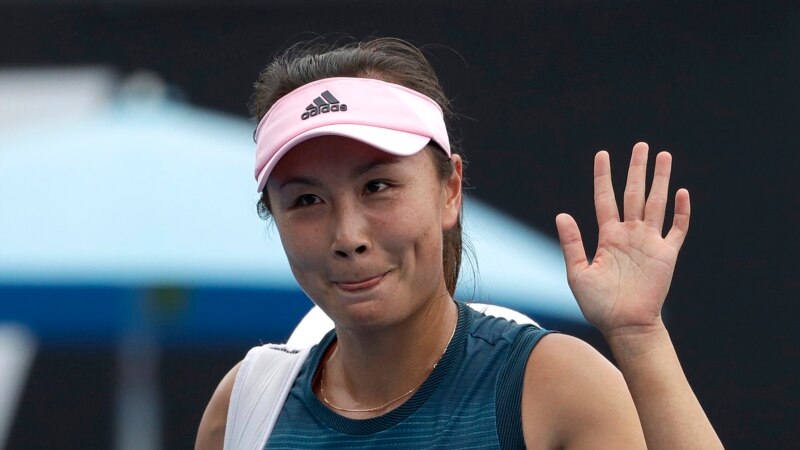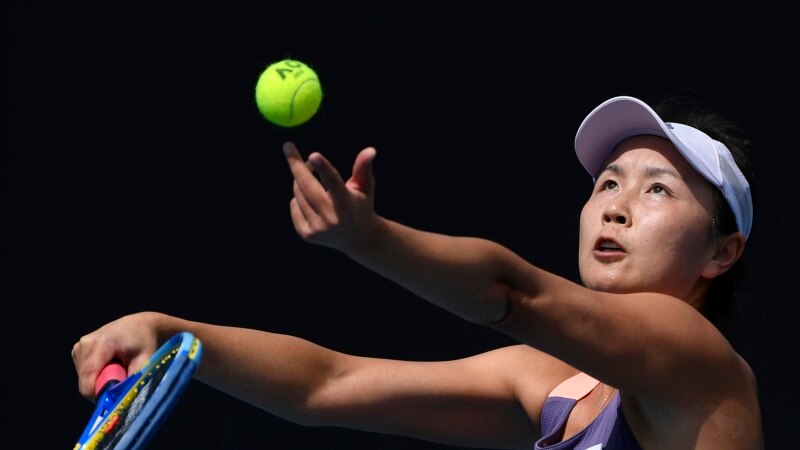
Olympic Committee Call with Chinese Tennis Star Raises More Questions
The head of the International Olympic Committee (IOC) spoke to Chinese tennis player Peng Shuai in a 30-minute video call on Sunday. The purpose of the call was to let the world know that she was safe. But it has raised more questions.
Tennis stars and fans began to worry about Peng last week because she had not been seen since accusing a former top Chinese official of sexual wrongdoing on November 2. The hashtag #WhereIsPengShuai? appeared on social media. The Women's Tennis Association, or WTA, threatened to stop its events in China.
On Sunday, the IOC said Peng spoke to its president, Thomas Bach, and other officials in a 30-minute video call from Beijing. The IOC’s statement after the call said Peng told officials that she was well, thanked them for their concern and asked for privacy.
The IOC shared an image that shows Bach looking at a screen on which Peng appears but did not release the video of the call. On the same day, China Open, a Chinese tennis event, released videos and images of Peng at a youth tennis competition in Beijing.
'Safe and well'
The IOC’s short statement gave few details and did not say anything about her accusation. That brought more criticism from the WTA. WTA head Steve Simon has been calling for a full, fair and open investigation "without censorship."
The IOC answered criticism in a statement Monday that said the main purpose of the call was to find out if Peng was safe. It said she "was very clear in confirming that she is safe and well."
She agreed to stay in touch with Olympic officials and planned to have dinner with Bach in Beijing in January. The IOC added that in order to respect Peng's privacy, it would not comment further.
Peng is not alone
Peng is one of a number of Chinese businesspeople, activists and common people who have disappeared in recent years after criticizing party officials.
The ruling Communist Party is quick to stop any criticism. But state media celebrate athletes' victories as proof that the party is making China strong. The party makes sure athletes cannot use their success and public appeal to weaken its image.
The tennis star accused a former member of the Communist Party's ruling Standing Committee, Zhang Gaoli, of sexual wrongdoing in a social media post that was removed quickly. The broadcaster CNN said that its signal in China had been blocked during reporting on Peng.
On social media, Peng told Zhang Gaoli that he was a person with great power. She said he could “dismiss” her accusation. But she said, “Even if I'm destroying myself, like throwing an egg against a rock, or a moth flying into a flame, I will still speak out the truth about us."
Zhang left public life about three years ago after being one of seven members of the Politburo Standing Committee —the highest position of political power in China.
I’m Jill Robbins.
Graham Dunbar reported on this story for the Associated Press. Jill Robbins adapted it for Learning English. Mario Ritter, Jr. was the editor.
Words in This Story
hashtag –n. a word or phrase that starts with the symbol # and that briefly indicates what a message (such as a tweet) is about
screen – n. The usually flat part of a television or computer monitor that shows the images or text; the part of a television or computer that you look at when you are using it
censorship –n. the system or practice of censoring books, movies, letters; examining media in order to remove things that are considered to be offensive, immoral, or harmful to society or people
athlete – n. a person who is trained in or good at sports, games, or exercises that require physical skill and strength
What do you think of the Olympic Committee’s actions related to Peng Shuai? We want to hear from you. Write to us in the Comments Section.
Share this article:
This article uses material from the VOA Learning English article, and is in public domain. Images and videos are available under their respective licenses.


